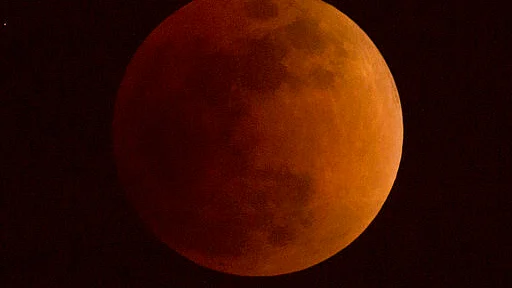‘Suraj hua maddham, chaand jalne laga’ will acquire special meaning on the night of 27 July, as people across the world get ready to witness the "blood moon".
The total duration of the lunar eclipse will be 1 hour and 43 minutes – the century’s longest – or, the time taken to reach Noida from Delhi after it rains for five minutes.
What is the lunar eclipse, you ask? During the lunar eclipse, the full moon moves into the shadow of the Earth cast by the sun, blocking direct sunlight. In this total phase, the mood appears dark red, earning its name. Various ancient religions and cultures have tried to explain the cosmic meanings of an eclipse, and there is no dearth of superstitions and folklore around the world.
Here's are five myths surrounding the lunar eclipse.
Duur se Dekho, Nahi Toh Aankhein Jal Jayengi
Obviously, the first myth is most common, made famous by our concerned mothers. But contrary to popular belief, the lunar eclipse does not harm the eyes. All you need are binoculars for clear view.
Now, on to the real myths.
Unfit for Consumption?
Indians widely believe in avoiding food during an eclipse. Mitali Madhusmita of Sri Sri Tattva Panchakarma explained to NDTV, "During an eclipse, the wavelength and intensity of light radiations available on the earth's surface is altered... This leads to uncontrolled growth of micro-organisms in food products during eclipse and the food products are not suitable for consumption."
Worshipping or "touching" gods is also prohibited during this period. Ayurveda suggests avoiding auspicious activity during an eclipse.
The Cunning Devil
An extension of the first, Hindu mythology explains lunar eclipses as the result of the demon Rahu who drank amrit, or the elixir of immortality, by disguising himself as a god. Lord Vishnu decapitated Rahu, but having consumed the elixir, Rahu’s head remained immortal. Seeking revenge, Rahu’s head chased the sun and moon to subsume them. If he catches them, we have an eclipse – Rahu swallows the moon, which reappears out of his severed neck.
End of the World
Christians believe the blood moon eclipse to be the end of the world. The connection between the two is made from the Biblical verse, which reads "And I will show wonders in the heavens and in the earth: Blood and fire and pillars of smoke. The sun shall be turned into darkness. And the moon into blood, before the coming of the great and awesome day of the Lord."
Islam, the Corollary
Eclipses are interpreted without superstitions in Islam. Both the sun and the moon represent respect for Allah, so special prayers are chanted.
Singing to the Moon
For the Luiseño tribe of southern California, an eclipse meant that the moon was ill and tribe members would traditionally sing chants and prayers to restore its good health.
A Hungry Frog
A Vietnamese myth said that an eclipse occured when a frog or toad ate the sun. Interestingly, the Vietnamese word for eclipse is "shih," which directly translates to "to eat."
Disclaimer: None of these myths about the nature or cause of eclipses are based in science or fact.
